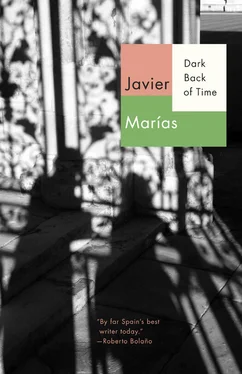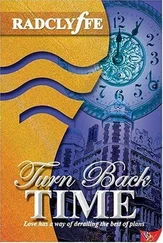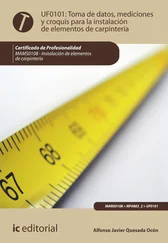
The paragraph is somewhat confusing, especially to someone who has no idea what it could be referring to, and I, initially, had no idea. What in God’s name are they saying? I asked myself as I read it, while Mercedes L-B went on laughing and gazing in satisfaction at the viticultural tip of her umbrella. What did they mean, “a habit of not seeing women”? That’s about the only thing I really have seen and still look at, always, both in and out of doors, and what’s more I know at a glance whether I admire them or not: I didn’t understand a word of it. I read and reread it, there in the restaurant, and showed it to Mercedes to see if she understood it any better and would leave off with her smugness, but she shook her head; until I suddenly figured it out. In describing the Alabasters, the narrator of the novel said, “But though he was invariably there as well, I don’t recall a single occasion when he answered my questions or inquiries. He would smile and say hello like a lively and energetic man (his whole bearing was intrepid), but he delegated every business matter or response, however trivial, to the greater knowledge and authority of his spouse. He would turn to her and vivaciously repeat the question that had just been asked of him, word for word, appropriating it, as if he were the one who wanted to know (‘Have we had anything in by Vernon Lee, darling?’), adding only the word ‘darling’ at the end.” And a little farther along the narrator returned to this: “The cheerful urbanity with which Mr. Alabaster greeted any customer who came in indicated that, in his subaltern passivity, the mere appearance of someone in the door of the shop had to be the great event of his day, and the effusive greeting he addressed to that someone its most glorious and sociable moment. For after that, as I’ve said already, he was incapable of answering a simple question or pointing a finger (‘Do we have a travel section, darling?’) towards the shelf that held what the buyer sought.”
All of this, it was clear, had not struck Mr. Stone as terribly funny — the “subaltern passivity” part wasn’t particularly flattering, I admit — though he had made me aware of this by the most delicate and discreet means possible, providing me, through his wife, by the way, with the photocopy in which he defended himself, or defended Alabaster, whom it was now certain he had taken possession of or adopted. The extraordinary thing was that in this interview the Stones were indirectly arguing with a novel, or rather they were refuting what a fictitious narrator had observed about two booksellers who were also fictitious, however much they had borrowed certain details or traits from the Mr. and Mrs. Stone of reality. And in order to deny that he, Stone, never answered questions and always transmitted them in their entirety to his wife as soon as he received them — but I had said that of Mr. Alabaster — they had found no better explanation than to claim that I — not the nameless narrator, but Xavier Marias, with a name — had acquired an extravagant, depraved habit from the Oxford dons, a habit I had never heard of before, which consisted of not seeing women, not registering them, erasing them, passing the gaze over them as if they were invisible or did not exist: this habit, then, would have led me — and hence my narrator — to address myself invariably to Stone and, we must suppose, to Alabaster, two or three times in succession, on every occasion and on numerous occasions, even though I knew very well that Mrs. Stone and, we must suppose, Mrs. Alabaster — whom, for that matter, I did not see, who were, for me, transparent — were the ones who could supply the answers. Perhaps this explained why, during my grape-bearing visit, Ralph, the husband, especially at the beginning, had tried to speak up before Gillian, the wife, whenever an answer or some information was required, so that I could register with my own eyes and ears that he was capable of supplying any information, requested or not, without having to consult her first. The idea was so appealing to me that I only regretted it wasn’t true: according to this, I would have come into the shop regularly without ever seeing Mrs. Stone because of this damnable habit picked up from the dons, so misogynous and cruel, those colleagues of mine; I would thus have asked Mr. Stone — who else? — if he had had in anything by Vernon Lee, for example; and then Mr. Stone, like a madman, would have turned toward no one and would, in turn, have asked this no one, “Have we had in anything by Vernon Lee, darling?”; this highly eccentric reaction — from my point of view, since I saw only air — wouldn’t have made me bat an eye, as if I were another madman, nor would I have made any inquiry with respect to his ethereal interlocutor, I would simply have waited out the obligatory seconds and then, not having heard any sort of response because I saw no one who could have supplied it, listened, very phlegmatic and natural, and on a regular basis, to the final reply of Mr. Stone after his consultation with someone who, for me, would have been, at most and with luck, a ghost who appeared only to him: “No we haven’t had anything by Vernon Lee in lately, Mr. Márias.”
Furthermore, and despite the belief the Stones unhesitatingly expressed in the interview, I was not attached to All Souls during my years at Oxford, and not only that but had never set foot in that strict and exclusive college, and did not do so, in fact, until last summer, 1996, when I was invited there by the kind musicologist Meg Bent after she read my novel. I imagine that the title had forestalled or imposed itself on their knowledge of me, I mean Mr. and Mrs. Stone’s. But at least they had said I was a nice young man, which is something to be very grateful for, even if retrospectively. As I passed by the bookstore later that day and saw them through the window in their habitual places at ladder and desk, I waved to them without stopping and hoped that neither Mr. nor Mrs. Stone ever runs the risk of having in reality to consult with a ghost or the air in the silence of their shop; that is, I hoped that when the time comes for one of them to die, they both die together.
And it is something to be very grateful for, even if retrospectively. I said that without intending much by it, only now do I notice it. Though I can be agreeable (I know I can but don’t always want to be, and never am with my many compatriots who are disagreeable and venomous and always think the worst: too many slanderers for too many years in this domain of brutality which death passes through with rusting tongues, making somberest shadow flow, and relentlessly); I’m no longer young and may not have been young then either in those distant days when I was thirty-two or thirty-three, long past the age of twenty-one, which, fortunately, was the age of legal adulthood in my time, and also past the age of twenty-seven, so decisive that Joseph Conrad called it “the shadow line” (perhaps it was decisive only in his day); the age of thirty had also been attained and left behind by the time I went to Oxford, the symbolic age beyond which, for instance, dying young, in the traditional sense, is almost impossible, though the modern view is more indulgent, one dies young at seventy-five: people say, “There was still so much left for him to do,” as if what we do were what justified our lives or what we miss about our dead, and not their presence and their gestures and their unbiased account of events or, even more, their listening attentiveness to our own account. The times become old times all too easily and are cast off, and what went before them becomes antediluvian, and yet they all gradually and deceptively overlap, we sometimes think there are no borders or abrupt stops or brutal cuts, that endings and beginnings are never marked out with the dividing line that, at other times, however, we think we see in retrospect; and that belief is deceptive, too, because neither the one nor the other exists, or only as an enormous exception: not the sure, clean slice — splinters always go flying — nor the juxtaposition or welter of confused and indistinguishable days — there are always forgotten patches and blotted out periods, I know them, to help us see the illusory limits. It’s all more mysterious than that, more like an artificial prolongation, attenuating and inert, of what has already ceased, a ceremonial resistance to yielding or to marking the beginning of what is to come, like the streetlamps that stay lit for a while when day has already dawned in the great cities and towns and train stations and empty village depots; they stand there still, blinking and upright, in the face of the natural light that advances to make them superfluous. At that hour, which is only witnessed by very early risers or the very nocturnal or very insomniac, there occurs, for brief moments, the visible manifestation — the metaphor — of how time, respectful time, behaves and what it consists of, for in time there is always civility and courtesy and even dissemblement, and at that hour, more than during the threadbare moment of twilight, time can be seen for what it is. These electric lights pretend that it’s still night, that their assistance is still necessary, they make as if not to perceive the conclusion of their reign, and the daylight, in turn, pretends not to see them and tolerates them, knowing that these waning lights are no longer a threat, and even appears to slow its own unfurling a bit as if to concede them time to grow accustomed to the arrival of their own futility and the idea of their cessation (“Put out the light, and then put out the light,” Othello had to say it to himself twice to take it in, even if he had already decided to do it), not forcing them to flee as soon as day-break looms white on the horizon, but only to withdraw, without being routed and in an orderly fashion, as armies once agreed on a cease-fire to allow the enemy to collect and count the dead and, in that way, begin to grow accustomed to the strange idea of their cessation.
Читать дальше













